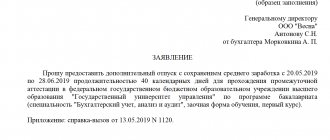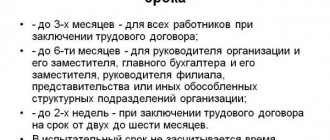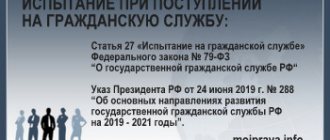What is a probationary period?
According to the Labor Code of the Russian Federation: a probationary period is a time period that is established by the employer in relation to a new employee . During this period of time, the professional qualities and skills of the employee and his ability to cope with work responsibilities are tested. The employee also adapts to the organization and understands all the intricacies of the work.
The presence of a probationary period clause is indicated in the employment contract. The absence of a clause means that the employee was hired without testing.
Attention
If an employee is actually allowed to work without drawing up an employment contract (Part 2 of Article 67 of the Labor Code of the Russian Federation), the condition of a probationary period can be included in the employment contract only if the parties formalized it in the form of a separate agreement before starting work.
During the employee's probationary period, he is subject to the provisions of the Labor Code of the Russian Federation and other regulatory legal acts containing labor law norms, collective agreements, agreements, and local regulations.
The trial period cannot exceed 3 months . For some categories of workers it can be up to 6 months . This applies if you need to check professional qualities:
- manager;
- deputy head;
- chief accountant;
- deputy chief accountant.
This is explained by the fact that in a shorter period of time it is not always possible to fully determine the skills and abilities of these employees. Also, the period of temporary incapacity for work of the employee and other periods when he was actually absent from work are not included in the probationary period.
Attention
If the employment contract is concluded for a period of two to six months, the probationary period cannot exceed two weeks .
Employer's obligation
It would be a mistake to assume that for an employee who has not passed the test, only notification of this fact is sufficient.
The direct responsibility of the employer is not only to comply with the dismissal process from beginning to end, but also to document the termination of the contract due to failure to complete the probationary period.
To do this, during the test it is necessary to provide the employee with those responsibilities that are directly related to his position. Writing assignments may cause trouble for the company, but it is more acceptable from the point of view of the law. The employee must provide reports on the work done. Based on these documents, the employer can prove that the employee performed his work unskilled and, therefore, did not pass the test.
In order for the dismissal to be justified and lawful, it is necessary to properly hire the employee. The fact of the probationary period must be specified in the employment agreement. It is also necessary to specify what payments and in what quantities the employee is entitled to during the trial. The most important thing is that the document contains the signature of the employee. This means that he is satisfied with all the working conditions and probationary period.
The order specifies the duration of the test. It is also necessary for the employee to review the test completion document and sign.
Any violation of labor legislation, as well as inattention to the execution of documents on the part of management, may lead to the employee’s disagreement with the reason for dismissal and an appeal of this fact in court. And the court will be on the side of the former employee, and this threatens the organization with fines and various compensations.
Don’t forget about the notice of failure to complete the probationary period, a sample of which should be available in every organization.
Dismissal options
If an employee has successfully passed a professional assessment and continues to work after the trial period, then he is no longer allowed to be dismissed from his position in a simplified manner (Part 3 of Article No. 71 of the Labor Code of the Russian Federation).
If a worker shows unsatisfactory results during the probationary period, then he does not pass the test and is dismissed according to a simplified scheme. This process can be carried out both at the initiative of the manager, and at the request of the employee himself, by agreement of the parties.
Important
If this happens at the initiative of the employer, then he must, no later than three days before dismissal, provide the subordinate with written notice indicating the reason for termination of the contract. The manager must draw up all the documents correctly, otherwise the employee may appeal such an initiative in court.
Women who find out about pregnancy during the probationary period cannot be dismissed without their desire. Single mothers who are raising a child over 1.5 years old are not eligible for any benefits.
Important
The employee has the right to undergo the dismissal procedure at his own request. He is obliged to notify the manager in writing three days in advance; the basis for dismissal is stated as “at his own request.”
Conditions and reasons
During the probationary period, employees have the same rights and responsibilities as ordinary full-time employees. This means that they are subject to the provisions of the Labor Code and can be dismissed on general grounds: for example, as a form of disciplinary action (for absenteeism, being intoxicated at work, etc.) or due to the liquidation of the company, and also at the employee’s own request.
With some citizens, termination of an employment contract due to failure to complete the probationary period is not allowed. They are listed in Art. 261 TK. These include pregnant women, women with children under 3 years of age, single mothers with disabled children under 18 years of age or young children under 14 years of age.
An additional special reason for dismissing an employee during a probationary period may be unsatisfactory test results. The outcome of the probationary period is assessed by the employer. Poor quality work may involve missing deadlines, failure to fulfill plans, management instructions, etc.
In order for the fact of dismissal due to poor test results to be considered justified (in the event of an inspection by the labor inspectorate or an employee appealing the dismissal in court), the employer must have on hand documentary evidence of poor quality work. For this purpose, reports from managers on the results of the test, memos from immediate management or official acts can be used.
A simplified procedure for terminating an employment contract with a person on a probationary period implies that:
- An employee can be notified of dismissal with a small time margin : 3 days in advance.
- Termination of an employment contract is permitted without taking into account the opinion of the trade union (under Part 2 of Article 71 of the Labor Code).
- The employee does not need to pay severance pay.
Dismissal based on the results of probation is permitted only before the end of the probationary period. If the specified deadlines have expired and the employee continues to work, then it is no longer possible to dismiss him on this basis.
Dismissal procedure
At the initiative of the manager
An employer who is not satisfied with the professional skills of a new employee must draw up a document stating all the reasons why the contract is terminated. The following nuances need to be taken into account:
- Notice that a worker is being relieved of his duties must be sent at least three days before this event.
- If the employee has not received the notification, then he is considered to have passed the test. Then the employer will not be able to fire him under a simplified scheme.
- The notification must contain a justified reason why the person was not suitable for the position.
- The manager should delay the decision to dismiss if the employee is absent due to vacation or sick leave.
Next, a dismissal order is issued. The employee gets acquainted with the text of the document against receipt.
Attention
The last stages of release from work are entry in the work book and payment of money for time worked.
At the initiative of the employee
If a working person understands that he cannot cope with the workload or the position is not suitable for him for some reason, then he has the right to resign on his own initiative.
Important
If the employee decides to resign before the expiration of the probationary period, then he personally or by mail (with a certified signature) notifies his boss of the termination of the contract.
A corresponding application is sent to the personnel authority of the enterprise, on the basis of which a dismissal order is prepared. Further, if necessary, testing is carried out. On the day of dismissal, the employee receives a paycheck and a work book.
Before signing all documents, the employee can withdraw his application. To do this, a new document is drawn up in which the employee asks to cancel the previous application. After this, the employee can continue to perform his duties as usual.
Attention
An employee can leave his place any day. The manager's consent is not required. The employer must be notified three days before dismissal.
Agreement of the parties
A fairly rare process is dismissal during a probationary period by agreement of the parties. The procedure exactly repeats the process of terminating employment relations by agreement of the parties with employees who have entered into a full-fledged employment contract. The termination initiative can be initiated by any of the participants: the employee or the employer.
An agreement is drawn up in which it is necessary to indicate all the nuances of dismissal (timing, amounts, etc.). After drawing up, it is certified by the signatures of both the employee and the employer. Based on the agreement, a dismissal order is drawn up, which is also signed by both participants in the labor relationship.
On the day of dismissal, the employee is given: a work permit (with the appropriate entry “dismissed by agreement of the parties”), cash, and other documents.
How to fire
Management has the right to dismiss an employee at any time during the trial, if this is provided for by labor legislation and does not violate the rights of the employee. Strict adherence to formalities is required.
How to fire an employee for failing to complete the probationary period? Let's consider a step-by-step algorithm for this process:
- Preparation of documentation that confirms the legal grounds for the decision made.
- Delivery of notice confirming dismissal due to failure to pass the test. This document must contain information that was the reason for dismissal: untimely completion of assigned tasks, non-compliance with work rules, disciplinary violations, poor quality work.
- Drawing up a dismissal order. Here the employee is required to sign as a sign of agreement with the reasons and fact of dismissal.
Is work needed?
Having decided to resign during the probationary period, the employee submits a corresponding application three days in advance. These three days from the date of application are the working days. This period is determined by Article 71 of the Labor Code.
Important
The working time can be reduced, but in no case increased. Therefore, the boss’s demands to work for two weeks are considered unlawful.
There may be no work at all if both parties agree on this. By mutual agreement of the parties, the employee may be released immediately. A specialist may also not work if he leaves work for a good reason, for example, when leaving for another place of residence or due to retirement.
Who cannot be fired during the probationary period
The law provides for special categories of citizens who should not be subject to checks during official employment. The following cannot be placed on a probationary period and, accordingly, dismissed under Article 71 due to failure of the test:
- pregnant women and those with young (up to 1.5 years of age) children;
- persons who have not yet turned 18 (officially, according to the law, employment can be obtained from the age of 14);
- applying for a specialized position in the first year after graduation;
- persons who were selected on the basis of a competition;
- invited from another organization;
- seasonal workers with less than two months' contract.
This is important to know: Does the employer have the right to refuse dismissal?
Entry in the work book
An employee is most often fired when he fails to fulfill his responsibilities within the time given to him. After the order is approved, an entry is made in the work book that the specialist is fired. The employer makes a note in it that the employee has not passed the conditions of the probationary period and is released from his position.
Attention
The labor document also notes that dismissal from office occurs under Article 71, since the person has not passed the conditions of the probationary period.
If the dismissal is formalized at the initiative of the employee, then the employment contract states that the employment contract was terminated at the employee’s own request.
"We don't owe you anything anymore"
Receiving a turnaround from the employer during the testing period, the unsuccessful employee has the right to all payments due to him by law:
- salary for the period of employment (the total length of service of the employee is taken into account);
- payment for sick leave (if this occurred);
- compensation for unused vacation days (2.33 vacation days are counted for each working month). A month is considered worked if the employee was employed for 15 or more calendar days.
ATTENTION! Vacation compensation must be paid even if the person did not have time to work for the 6 months required to go on vacation for the first time.
With this form of dismissal, it is not necessary to demand payment of severance pay.
Entitled payments
Labor legislation provides that a person signed up for a probationary period under an employment contract has the right to receive all payments established by law.
On the day of dismissal, the employee can receive all wages for days worked. It is also possible to arrange payment of monetary compensation if there is a period of unused vacation.
For your information:
The management of the enterprise lists all the amounts that were specified in the contract. This issue is regulated by Article 140 of the Labor Code of the Russian Federation.
Is it possible to get laid off?
Various reasons may prompt the owner to reduce the staff of his organization. For example, the reason could be an economic crisis in the country or the merger of this company with another organization.
Or maybe another person becomes the owner and he lays off employees. And quite often, layoffs apply not only to people working full-time, but also to those who are undergoing a probationary period.
Reduction during the probationary period is legal and there can be no violations of the Labor Code here.
If an employee is going to be laid off, he must receive all the payments intended for him:
- Severance pay, the amount of which is equal to the average monthly salary specified in the contract.
- The employer must compensate for the vacation due but not used by the employee.
- For the time worked, wages are issued.
Further about whether they can be fired after a probationary period?
Sick leave
Article 70 of the Labor Code of the Russian Federation establishes that, under a concluded contract, a specialist is required to pay for sick leave according to established standards. It happens that the management of an enterprise enters into a contract with a specialist for the provision of paid services, when only the work performed is paid for. In this case, there is no question of paying sick leave.
A manager cannot fire a subordinate while he is absent due to temporary incapacity due to vacation or illness.
For your information:
If the probationary period has expired while the specialist was not at work for some period of time for a valid reason, then the probationary period is extended by the amount of time that the employee was absent.
Reasons for possible dismissal during the probationary period
Many people mistakenly believe that it is easy to fire a person during a test by simply expressing such a desire. An employee can leave without explaining the reasons for his decision, but the employer must have compelling, documented reasons provided for by law. They are the same for all employees:
- inadequacy of the applicant for the position provided, insufficient quality of the work performed - clause 2 of Article 40 of the Labor Code of the Russian Federation (must be documented);
- inability to fully perform professional duties due to changes in health status – the same point;
- violation of internal regulations, job descriptions, discipline requirements – clause 3 of Art. 40 (there must also be confirmations);
- unexcused reasons for absenteeism - clause 4 of article 40;
- showing up at the workplace drunk or under drugs – clause 7 of Article 40;
- criminal offenses – clause 8 of Art. 40.
Calculation and payment terms
According to Article No. 140 of the Labor Code of Russia, in the event of dismissal of an employee, settlement with him is made on the day the employment relationship is broken.
The following charges are possible:
- bonuses;
- official salary;
- sick leave benefit;
- amounts due when paying for labor at the tariff rate;
- compensation for unused vacation periods.
The full payment option depends on the payment system and other circumstances.









